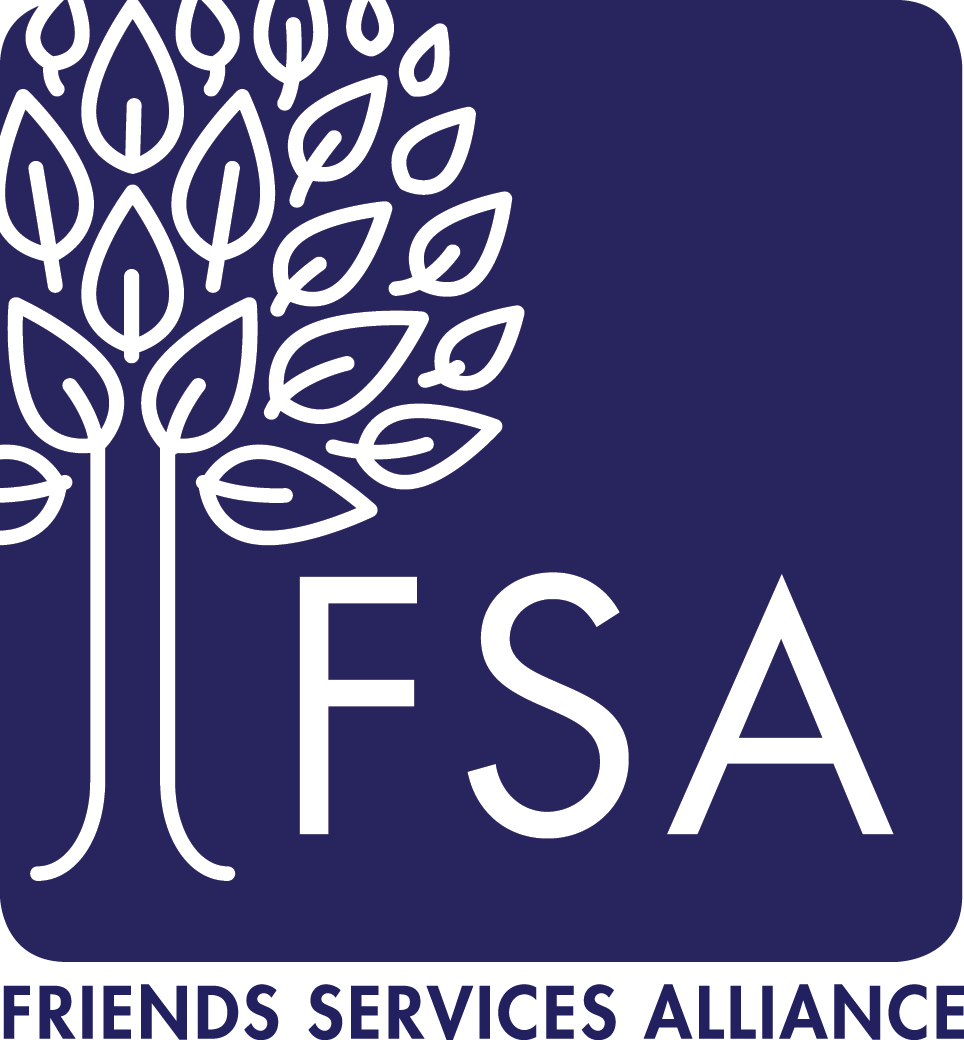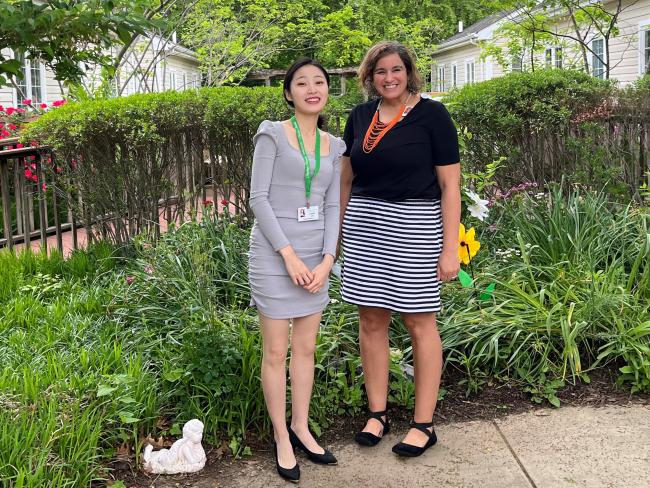With heavy gloves wrapped around their hands, sixth grade boys and girls struggle to pick up small objects. As they try to grasp a pencil, a television remote, or a toothbrush, what should be a simple act becomes clumsy and difficult.
In another exercise, the 11- and 12-year-olds wear blindfolds and each attempt to singlehandedly remove a walker attached to a wheelchair.
These activities are part of a sensitivity training exercise conducted between Pennswood Village in Newtown, PA, and neighboring Newtown Friends School. Teaching students about some of the challenges faced by Pennswood residents helps create a level of understanding between the two groups as part of a greater concentration on developing intergenerational relationships.
But make no mistake: focusing on one group’s challenges is just a fraction of this relationship between young and old. There’s plenty of action, too. Some residents provide hands-on assistance within classrooms at the school. And together, they play bocce, work in the garden, build birdhouses and more.
“One of my favorite things was hearing about the time our 104-year-old resident played Wii Bowling with the kids,” says Dottie Coppock, a Pennswood resident who volunteers weekly with a kindergarten class. “And she had a strike or a spare on every turn! Her team won because of her. The students couldn’t believe it.”
Coppock and her husband, Robert “Barry” Coppock, have lived at Pennswood for about a year and half. Not long after getting acclimated, they asked to volunteer within the schools. “We both worked in education our whole lives,” she says. “Helping with kids in the classroom is important to us.”
At Newtown Friends, Coppock volunteers in the Pre-K class as well as the library. One of the things she loves most is the sense of community felt between the students and residents. “We don’t just go there; the kids come here, too.” In fact, the Coppocks’ own children, who were students at Newtown Friends, benefited from the intergenerational partnership with Pennswood in the 1980s. “We have a photo of our daughter learning how to read braille with a resident.”
Pennswood Village resident Dottie Coppock volunteers
within the classroom at Newtown Friends School
Older kids benefit from a relationship with Pennswood, too. High school students from the nearby George School receive feedback and help strengthening their papers and proposals from residents. In turn, the students will provide assistance with the technology that is part of their everyday lives, sitting with residents and helping to familiarize them with laptops and phones.
“Tech cafes” are common in continuing care retirement communities, as folks contend with the continuing evolution of phones and computers. So it’s not surprising that Friends House Retirement Community in Sandy Spring, MD., has one as well. In this case, high school kids from Sandy Spring Friends School demonstrate the basics of handheld devices to residents.
But this relationship extends far beyond anything basic. Technology aside, this group of students and residents enjoy tackling even more challenging topics. In fact, last year they participated in a “Big Read” to commemorate the 50th anniversary of Loving vs. Virginia, the landmark Supreme Court decision that invalidated laws banning interracial marriage.
Organized by school librarian Johanna Cowie, readers of all ages participated in this event. Friends House residents, plus Middle and Upper School faculty, staff and students, read “Loving vs. Virginia” by Patricia Hruby Powell. Elementary-age students read an age-appropriate version of the story: “The Case for Loving,” by Selina Alko. Then, all sat in on a panel discussion about civil rights and interracial marriage.
Students and residents participate together in a variety of other activities as well. “We host ‘Oral Histories,’ which are intergenerational group discussions with classes about ‘today’ vs. ‘yesterday,’” says Erin Mitchell, Resource Coordinator for the organization’s Aging Well with Friends program. During these discussions, residents enjoy sharing with fourth grade classes what life was like when they were young, covering topics such as elections, civil rights and inflation.
They also create art for the Empty Bowls program, in which members of the community may purchase a bowl to raise money for programs that feed the hungry; and residents are invited to view the students’ concerts and plays.
Ohio-based Kendal at Oberlin approaches its intergenerational relationship building a bit differently. Through an active internship program led by Student Volunteer Program Coordinator Michele Tarsitano-Amato, about 30 college students per semester hone their skills and contribute programming through the retirement community.
Some of these students, in exchange for their service hours at the organization, live in a duplex on Kendal’s campus. The duplex, purchased from a current resident, is located in a neighborhood at the edge of Kendal’s campus, and is outfitted to house four students at a time.
The ways in which students complete their service hours vary based upon their skills and interests. One intern learned the old folk art of weaving bobbin lace from a resident, and then applied its processes to her art therapy coursework. “This transfer of wisdom is what our programming is all about,” says Tarsitano-Amato, who has worked there since 1993. “90% of our residents have a bachelor’s degree or higher, and they have many interests and skills. They have a lot to offer to younger generations.”
Another intern—whose major is in early learning—created a preschool literacy program toolkit to assist kids in the preschool Kendal Early Learning Center. And, a current clinical psychology major is working with older adults through Kendal’s Social Services department.
Megan Caracciolo, a senior Penn State student who applied for her internship through FSA, has developed an eight-week memory enhancement course.
“To be honest, I was a little discouraged at first,” says Caracciolo about the kick-off of her program. “I had announced the course to a group and not many of them had questions about it.” But to her surprise, “After 48 hours, we had to pull the registration sheet because it was full!”
The class consists of a discussion of brain anatomy and various techniques and strategies for exercising one’s memory. “In one class, we covered five techniques for remembering names,” says Caracciolo. “We do exercises in word recall and discuss the differences in how people’s brains work.”
Caracciolo and the residents are getting more than just an opportunity to develop skills. In addition to the respect she earned with Kendal at Oberlin staff members during her eight weeks there, she has formed bonds with residents. She recently spent several hours with a resident who was being moved from Assisted Living to Dementia unit. “She was anxious, so I stayed with her. She held my hand when she needed to.”
The relationships created are not soon to be forgotten by anyone involved. And after Caracciolo leaves, a second round of older adults—who have been on the wait list for her class—will benefit from the programming she created. Says Tarsitano-Amato, “Megan and other students like her are more than just interns, they are ambassadors to the greater community. We benefit from their presence just as much as they benefit from being here.”
* * * *




